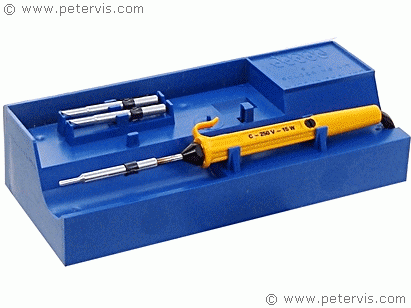How to Choose a Soldering Iron

If you are a student just starting out, then a simple good quality precision soldering iron is important to have, and it is usually that one tool that remains a constant over the years. Usually, a pencil iron operating between 15 W and 30 W is ideal for an electronics student. If you are living in the UK, you will be on a student budget, and you already may have a huge student debt, which you are required to pay off at some point; hence, you need to make sure you are spending the money wisely. With soldering irons, it is very much a question of getting what you pay for. On eBay, you will see a wide range of soldering irons, and you can buy a soldering iron from as little as £3.00 including postage from China. Many Chinese ones will arrive with a two-pin plug instead of a three-pin British Standard plug. Moreover, they are designed to operate on a 220 V mains supply.
Soldering Iron Wattage
Wattage determines the amount of transferable heat capacity an iron has. A high wattage iron can transfer a more heat to a metal surface then a low wattage iron. If you need to solder large chunks of solar cell panel terminals, then you will need a high wattage soldering iron. Whatever the wattage of a soldering iron, they all usually use copper or metal tip that dictates their working temperature range, and an electronic temperature regulator ensures that they operate within the required temperature range. Typically, you can expect the tip to be around 380 °C.
Students often think that higher wattage irons are better, however, that is not always true. For printed circuit boards, and through-hole packages it is better to use a low wattage soldering iron, because transferring excessive heat to the PCB can char them, and the pads might detach as well.
Buying a Soldering Iron
Back when I started out, we did not have such a wide range of cheap imports from the Far East to lead us astray. Why would you buy a cheap import when you could buy a wonderful soldering iron made by a British company just around the corner in Plymouth, Antex!
I was just recently reviewing my old Antex soldering irons and thinking how lucky I was, because it was a good call. I could very easily have bought something cheap and nasty that would have put me off electronics altogether. Hence, if you want to know about quality precision soldering irons then you need to have a look at these articles that compares my vintage Antex with the modern soldering iron.
Antex CS18
I thought the Antex CS18 pencil iron seems to be a good choice with price ranging from £15 to £20. This is a 230 V 18 W Soldering Iron, and 18-watts of reserve power is good enough for most printed circuit boards. It comes with a No: 1100 tip, which is a 2.3 mm chisel tip that can reach a temperature of up to 390 °C, which is ideal for through-hole and SMD components.
The 1.5 m PVC mains cable complete with a three-pin UK plug works well for many. You will need to get a nice stand to go with that to hold your hot soldering iron. The Antex ST6 stand, which costs around £7.00 on eBay, should provide good wear for many years. The total length of the pencil iron is 182 mm, and it is very light and comfortable to hold. A quality tool makes precision work much easier. Crafted with excellent engineering, to the highest quality guidelines, the heat balancing on all Antex soldering irons is perfect. Even a vintage SK1 works really well after all these years.
Antex soldering irons tend to use a ceramic heater for the inner shaft, and this provides near-perfect insulation. Thus, they exhibit the one of the lowest leakage currents compared to other manufacturer's designs. For this soldering iron, a leakage current of 1.5 uA, is more than good enough, when working on sensitive CMOS components.
This Article Continues...
A Soldering Guide for Beginners, Kids, and Electronics StudentsSoldering Guide: Safety Tips
Choosing the Right Solder Wire
How to Solder
Soldering Guide Basics
Soldering SMD Guide
Soldering in Space
How to Choose a Soldering Iron
Omega: Rosin and Lead Free Solder